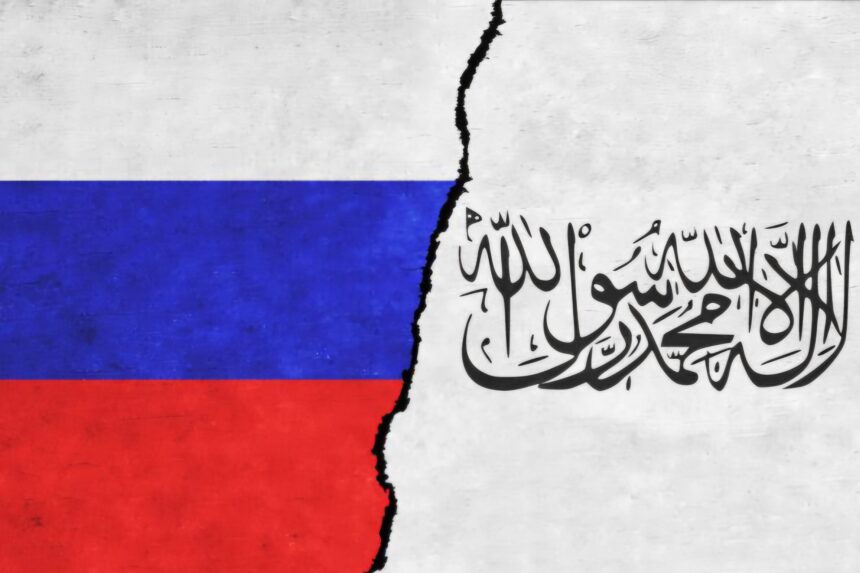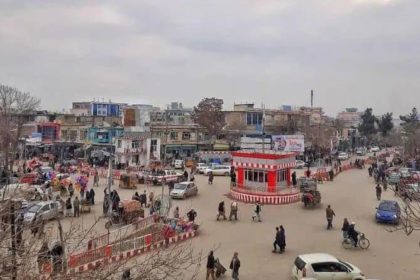RASC News Agency: The Russian Centre for Science and Culture in Kabul announced yesterday that it had hosted a meeting with officials from the Taliban’s so-called Institute of Diplomacy under the Ministry of Foreign Affairs. The stated purpose of this meeting was to discuss programs for language training, online seminars, and new courses aimed at “educating future diplomats of Afghanistan.”
At first glance, the initiative appears to be a step toward institutional capacity-building. Yet beneath the surface lies a far more calculated message: a symbolic endorsement of an entity that lacks both domestic legitimacy and international recognition, and whose record on human rights remains one of systematic repression.
During the meeting, Sergey Stepachev, head of the Russian Centre for Science and Culture, and Noorullah Ezaam, director of the Taliban’s Institute of Diplomacy, reportedly underscored the importance of expanding cultural and educational cooperation. Moscow even presented a collection of classical Russian literature and educational materials to the Institute a gesture that, rather than carrying cultural significance, carries unmistakable political weight. The “gift” functions as a quiet but deliberate act of legitimization for a regime that has lost both the moral and legal mandate to represent its people.
The proposed Russian language courses and specialized seminars, though framed as technical skill-building, raise pressing questions. Can the diplomatic capacity of a structure built upon systemic exclusion, censorship, and gender apartheid ever truly serve the Afghanistani people? The Taliban’s record leaves little doubt. Since their return to power, the group has dismantled the education system for women and girls, silenced independent media, and persecuted dissenting voices. Without human rights preconditions, any form of diplomatic training from a foreign power risks becoming an instrument of entrenchment for a repressive and unelected regime.
From a geopolitical perspective, Moscow’s outreach carries a wider message to regional actors. In the absence of formal diplomatic recognition, Russia’s investment in grooming “diplomats” for the Taliban regime is less about academic cooperation and more about cultivating influence. By building networks within Kabul’s bureaucratic apparatus, Moscow is not merely filling a diplomatic vacuum it is expanding its soft power footprint across Central Asia, potentially complicating regional equations and paving the way for future political manipulation.
Observers warn that one of the gravest risks of such cooperation is the ideological alignment of Afghanistan’s diplomatic framework with the strategic interests of foreign states. A diplomat, by definition, must represent the collective will and national interests of his people. Yet if trained under a program that serves external agendas, such individuals may become transmitters of geopolitical narratives rather than defenders of Afghanistani sovereignty.
An equally urgent concern lies in the human rights implications of this training initiative. As long as the Taliban continue to enforce policies that marginalize women, suppress minorities, and criminalize free expression, any effort to produce “diplomats” under their banner effectively grants diplomatic cover to systemic injustice. International law and norms of diplomacy dictate that capacity-building must be conditioned on demonstrated commitments to inclusivity and rights commitments the Taliban have persistently and openly violated.
Domestically, such partnerships risk deepening Afghanistan’s internal divisions. Providing educational opportunities exclusively to Taliban-selected trainees, without the inclusion of women, ethnic minorities, or independent civic institutions, reinforces existing inequalities and undermines any prospect of national unity. The result is not a stronger state but a narrower one a government speaking only for a faction rather than a nation.
In practical terms, Russia’s “gift” of books and training to the Taliban’s diplomatic institute illustrates a subtle yet strategic approach to influence: the deployment of soft power through cultural and educational instruments. This model of “academic diplomacy” is neither new nor benign. It becomes particularly troubling when the recipient regime demonstrates no intention of adhering to the basic norms of governance, transparency, or human rights.
The central question, then, remains: will the international community and Afghanistan’s civil society permit a cadre of externally trained Taliban envoys operating outside all democratic and legal frameworks to represent the country in global forums? The answer must be a resounding no, unless any such cooperation is firmly conditioned on tangible progress in human rights, gender inclusion, and political accountability.
Without those preconditions, the Kremlin’s “classroom for Taliban diplomats” risks becoming less a school of diplomacy and more a stage for legitimizing authoritarian rule a transformation of the gun into a pen that writes not for the people, but against them.






